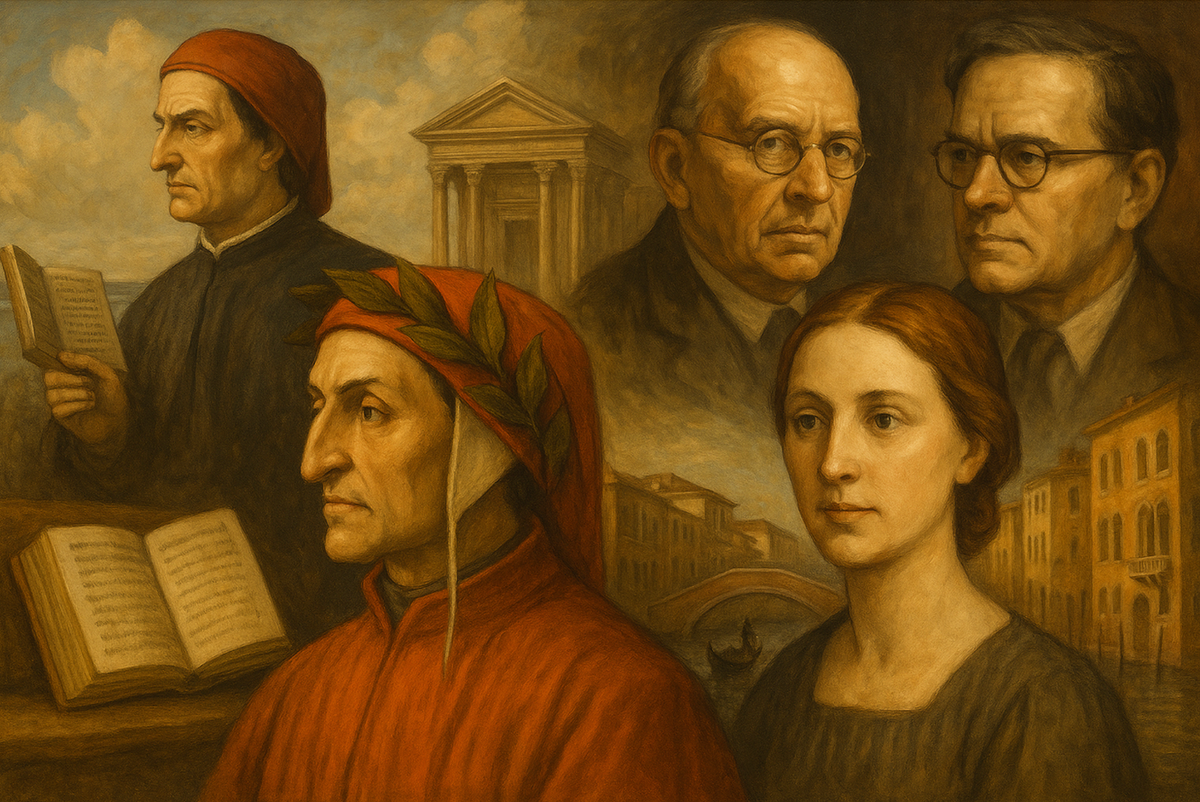

To live the life of the mind is to navigate the deep currents of thought and the restless tides of the world with the scholar’s precision and the poet’s eye. Here, the arc of a life bends toward the True, the Good, and the Beautiful, and the work begins.
From the Waters of Venice
The gondolier leans into the oar, the prow cutting a slow seam through the green-black silk of the Grand Canal. The air is salted with the faint brine of the lagoon, laced with the scent of wet stone and timber long acquainted with the tides. Above, a balcony sags with age, its ironwork blooming rust the colour of old blood. Bells somewhere in the city mark the hour, not with urgency, but with the gravity of centuries.
Venice does not hurry. It endures.
As the gondola moves forward, the gondolier gestures to the façades, palaces, churches, and merchant houses, standing much as they have for half a millennium. On certain nights, when the canals are still and dark, there is a quiet so deep it borders on the ominous, a silence reminding you that these same waters have carried traders, nobles, poets, and exiles for centuries.
Beneath the elegance lies unseen labour: millions of timber piles, driven into the lagoon and sunk deep into clay, forming the hidden foundations upon which the city endures.
So it is with our own order, democracy, the republic, and with the life of the mind itself. What endures must rest on principles strong enough to bear the weight of centuries: truth, justice, beauty, and the discipline of reason.
It was Venice that Frederic C. Lane devoted much of his life to studying, examining its commerce, empire, and the discipline of scholarship, to study as though with a magnifying glass until the fibres of history are laid bare. Robert Caro urges us to “turn every page,” not only in archives, but in the lives of those who wield power. To understand power, he insists, is to understand humanity.
James V. Schall, in The Life of the Mind, reminds us that thought is not an escape but a turning toward the depths. A.G. Sertillanges, in The Intellectual Life, sets the standard: intellect must be joined to moral rigour, the ordering of one’s hours, one’s reading, one’s reflections, so the mind becomes a craftsman’s tool, capable of truth’s precise work.
This is the discipline I now take up: the scholar’s magnifying glass, the biographer’s relentlessness, the gondolier’s steady oar, the life of the mind, embraced as a lived vocation.
The Current Reaches the Sea
There comes a moment when the long arc of one’s labours bends toward a different horizon. My own has been years in the making.
The first part of my life’s work unfolded in enterprise, academia, and, most recently, the relentless theatre of the law and the public square. In boardrooms, lecture halls, and courtrooms, I learned precision, patience, and poise.
Yet all the while, a quieter current ran beneath the noise, the pull toward authorship. Today, that current has reached the sea — a destination long foreshadowed, yet newly vast, and full of promise.
The Active and the Contemplative
Dante knew the active and contemplative lives were not separate provinces but interwoven territories. Contemplation is no idle gaze; it is disciplined engagement of intellect and sense.
To contemplate is to marshal the mind’s full power and invite the senses into service: the shaft of afternoon light across a desk, the faint grit of ink beneath the nib, the murmur of a turning page. These moments are not ornament; they are the scaffolding of thought.
Sertillanges called such work a vocation, obliging us to live well so we may think well. The contemplative life communicates, learns, and shapes the unspoken into words capable of carrying the purest ideas we can muster.
The Chronicle of Florence
Leonardo Bruni, official historian of the Republic of Florence, initially hesitated when asked to write its history. Only after deep reflection did he accept, devoting twenty-five years to his monumental History of the Florentine People. In chronicling a republic, he strengthened the studia humanitatis—the study of the humanities—that undergird a free society.
For eight years, I have served as chair of the board of a nonprofit organisation whose property, held for the service of our community, became the subject of a prolonged and difficult legal process that tested statutes, governance, endurance, and steadiness of mind and spirit.
Through that season, I have learned that to endure is to stand not merely for walls and ground alone, but for the principles they shelter, the work, the worship, the service to which they are dedicated. In Bruni’s example, I see the call to bear witness, not as a partisan, but as a steward of memory and truth.
As Tennyson wrote, “To strive, to seek, to find, and not to yield.”
The Turning of My Season
I was seventeen when I left my parents’ home, the ink on my high school diploma scarcely dry, to begin the formal journey into the collegiate world. That was four decades ago. Now, in my fifty-seventh year, I stand in the autumnal light of a long season, one marked by questions and discoveries, seasons of plenty and want, moments of fellowship and of exile.
This week brought news of the passing of my dear friend, Professor Andrew Kakabadse of Henley Business School, a man whose intellect was as fierce as his generosity was unguarded. His death brings to mind all those who have come and gone, whose presence once shaped my journey.
I remain. And in that remaining lies memory and responsibility. The next season demands a different discipline: shaping a lifetime’s thought into words, weighing each sentence as a craftsman weighs the grain of wood before the cut, writing not for the vanity of arrival, but for the humility of discovery.
And so I take up the pen, not as one finished with learning, but as one ready to learn more deeply than ever before. The page will be my lecture hall, the line of ink my pilgrimage, the quiet work of language my vocation.
Why Now
After years of conflict and ceaseless motion, the dust has settled. Stillness is not absence, but sharpening. The blank page is not void, but expanse.
To write with rigour, to feel the weight of each word before setting it down, this is labour worthy of a lifetime. The active life taught me engagement; the contemplative life now teaches me form.
Here the arc bends.
Here the work begins.

